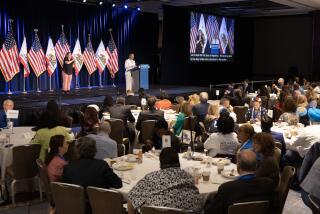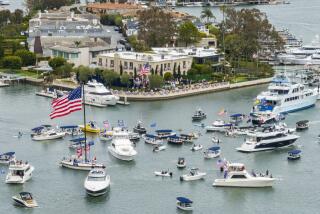Clintons Asked Potential Givers for ‘Help’ With Ads
- Share via
WASHINGTON — President Clinton and First Lady Hillary Rodham Clinton asked prospective financial supporters at a series of special White House breakfasts in 1994 for “help” in countering a well-financed advertising campaign being waged against the administration’s health care reform initiative, the administration acknowledged Wednesday.
White House officials said that nine breakfasts and one luncheon, sponsored by the Democratic National Committee, were designed “to generate support--both political and financial” for a pro-reform counteroffensive. The committee received $460,000 in large donations from at least 11 participants during the four months in which the events took place, according to federal election records.
Former administration and Democratic sources said that the purpose of these functions “was to raise some serious money quickly.” An internal White House memo indicated that they resulted in more than $1 million in contributions.
But it was not clear whether Clinton or the first lady directly solicited money at the events. Clinton “can’t remember specifically asking for money at these events but he might have,” said Lanny J. Davis, a White House special counsel.
The new details of the breakfast program, first disclosed by The Times in April, add further to the controversy over whether Clinton solicited political donations in the White House. The Justice Department is reviewing the fund-raising role of both Clinton and Vice President Al Gore and whether they may have run afoul of federal election law by making fund-raising phone calls from the White House.
Clinton hosted at least eight breakfasts and Mrs. Clinton presided at a breakfast and a lunch between April and August 1994, according to a White House compilation. One session was set in the Old Family Dining Room in the first family’s residence and the rest were in the White House Map Room, the site of scores of Democratic National Committee-sponsored “coffees” for campaign donors and supporters in 1995 and 1996.
“The president and the first lady asked for people’s help in combating the ‘Harry and Louise’ [television] ads and other ongoing efforts to undermine the health care initiative,” Davis said. “These breakfasts provided them with the chance to discuss the administration’s initiative and to seek their support.”
White House officials said that the breakfasts were legal and that any money associated with them was directed to a Democratic advertising effort to offset “special interest money” seeking to defeat Clinton’s health care plan. These funds were not to be used for partisan political purposes, officials said.
In a statement issued by the White House on Wednesday, Lynn Utrecht, who served as counsel to the Clinton-Gore campaign, said that the money generated “to support the president’s health care plan is not covered by the Federal Election Campaign Act. It was raised and spent for a purpose totally outside the act and under no circumstances could it be considered a ‘contribution’ under the act.”
Federal law prohibits soliciting or receiving a campaign contribution “in any room or building occupied in the discharge of official duties.”
Kim Rubey, deputy DNC press secretary, said that $5.1 million was spent on the health care reform campaign. Much of it went to produce and air television ads and to generate grass-roots support.
Rubey said that party officials believe all funds solicited for the health care campaign were placed in a so-called “soft money” account for generic party-building activities rather than direct expenditures on behalf of specific candidates. But, she added, “we haven’t had the opportunity to check our records.”
Atty. Gen. Janet Reno has said that such unregulated funds are not subject to federal election law. It was disclosed earlier this month that the Democrats had shifted some “soft money” contributions solicited by Gore into “hard money” accounts without consulting the donors.
Referring to funds raised from health care breakfast participants, a senior administration official said: “Any money that might have been contributed after these events into hard-money accounts would have been an independent decision that should have involved a solicitation by the DNC.”
The health care initiative was eventually defeated, a crushing blow to both the president and Mrs. Clinton, who had been its chief proponents.
Opponents vastly outspent advocates of the plan--a lesson that subsequently proved instrumental in the ambitious effort by the White House and the Democratic Party to raise more than $125 million in “soft money” during the 1996 campaign.
The White House has withheld details of the breakfast program for months. Officials declined to answer questions about it when The Times reported on the health care fund-raising effort on April 4 and thereafter. They disclosed the new information Wednesday only after the Associated Press raised questions after interviewing a participant.
White House and Democratic officials said that they were unable to provide a total amount raised through the executive mansion events. But an internal fund-raising document compiled by then-Deputy White House Chief of Staff Harold M. Ickes on June 27, 1994, included a figure of $1.3 million for eight health care breakfasts “w/Potus”--the White House acronym for the president of the United States. Ickes attended five of the events.
Sources familiar with the breakfasts said that participants were asked for as much as $50,000 or $100,000, either before or after the events, to help bankroll the health care ad campaign. Several of those who attended said in interviews that the Clintons did not solicit their guests.
Terence R. McAuliffe, a former Democratic finance chairman and chairman of Clinton-Gore ‘96, who attended seven of the breakfasts, said: “The president said, ‘Thank you for your help. Health care is important.’ This is no different from coffees or anything else.”
McAuliffe, an architect of the program, said: “It was another outreach to our political and financial supporters who had been helpful or we hoped would be helpful.”
He said that contributions were solicited after the sessions by himself; his assistant, Laura Hartigan, or by then-Democratic Chairman David Wilhelm, all frequent breakfast attendees. Wilhelm also said that “there was never a pitch” for funds by the president at the events.
Chiao Jen Wang, a semi-retired aeronautical engineer from Arlington, Va., who attended a June 28, 1994, breakfast with the first lady, said that “at the meeting, there was no mention of raising money.”
Rather, he said, “the discussion was strictly on how to wage a campaign and whether the DNC was doing enough. . . . Most people indicated at the meeting that the DNC was not doing enough to get the message out.”
Wang said that he received several requests from Democratic fund-raisers to make donations. Federal Election Commission records show that Wang gave $50,000 on May 10, 1994.
Times researcher Janet Lundblad in Los Angeles contributed to this story.
More to Read
Get the L.A. Times Politics newsletter
Deeply reported insights into legislation, politics and policy from Sacramento, Washington and beyond. In your inbox twice per week.
You may occasionally receive promotional content from the Los Angeles Times.










